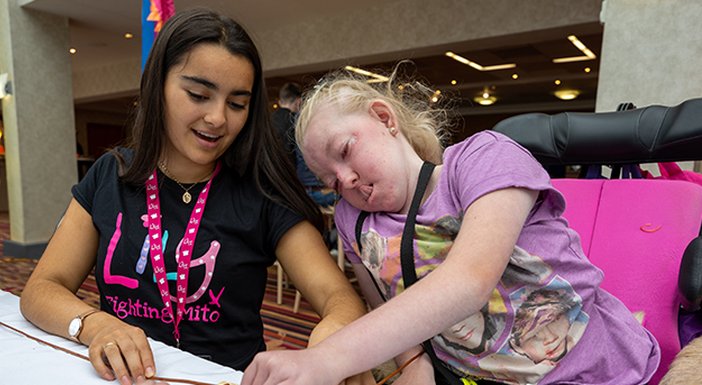
Further support
Everyday tips and tools to make living with mitochondrial disease that little bit easier

Everyday tips and tools to make living with mitochondrial disease that little bit easier
There is more help available, but sometimes it’s knowing where to look. We endeavour to make mitochondrial disease patients and their families aware of every benefit or extra that they might be eligible for. Because sometimes it’s the little things that make a big difference.
Citizens Advice is a network of independent charities offering free confidential information and advice by email, webchat, phone or in person. They assist with legal, debt, consumer, housing and other problems.
Services are available to help mitochondrial disease patients and carers dealing with illness and disability. These vary from help at home from a paid carer to meals on wheels, from home adaptations and specialist equipment to different types of housing, depending on your individual needs. Visit the NHS website to find out more.
Access to Work is a government programme designed to help you get or stay in work if you have a physical or mental health condition or disability. Depending on individual needs, the scheme awards grants for things like specialist equipment and assistive software, physical changes to a workplace or adaptations to a vehicle in order to get to work.
When you’re living with mitochondrial disease, it’s important to have tools that help you quickly and clearly communicate your medical needs, especially in emergencies or unfamiliar care settings. The following simple but powerful helpers can make a big difference in how you’re treated and how confident you feel in your day-to-day life.
These handy cards provide the contact details of a patient’s specialist and are ideal for emergency admissions when medical staff may not be familiar with mitochondrial disease. Currently available through specialist centres at Bristol, Cambridge, Glasgow, London (UCL) and Oxford.
We’re always happy to discuss providing medical alert cards to any specialist mitochondrial or metabolic team who cares for mito patients. If you’re being seen at a centre that doesn’t yet provide alert cards to their patients, please encourage your mito specialist team to email [email protected] and we can arrange for these to be provided.
Created with CamRARE, this simple but brilliant document outlines essential medical and care details for people with mitochondrial disease. Perfect for clinic visits, travel or emergency situations, it’s easy to update and is designed to be printed out, either single or double-sided, and stored in a folder or folded into a wallet with a lanyard.
If you or a loved one are affected by mitochondrial disease and would like to register for a Rare Patient Passport, please complete the online form. Don’t forget to select ‘The Lily Foundation’ when asked if you’d like a branded passport from a specific patient group.
Just like rare patient passports, medical alert wristbands offer a vital way to communicate your healthcare needs when you’re unable to do so yourself. Created by our friends at My Mito Mission, each includes a QR code that links directly to the clinical guidelines developed by the specialist mitochondrial centre in Newcastle.
These guidelines help healthcare professionals understand when standard treatments might need to be adapted and provide contact details for further expert advice. With a range of personalisation options, you can find out more and order a wristband via their website.
The Cinema Exhibitors Association Card (CEA card) can be used to allow a carer to get in free to a cinema when accompanying a person who is in receipt of a qualifying disability benefit.
When visiting any entertainment venue it’s always worth asking if they have a carers’ scheme.
This is a card you can carry to help you access toilets where there are no public toilets available. You can get a paper copy or download the app. Find out more.
RTC Travel are a travel agent who can arrange specialist holidays for wheelchair users and people with limited mobility. They have access to a range of hotels around the world that cater for disabilities, and all their flight-inclusive packages are ATOL-protected for added peace of mind.
If you have mitochondrial disease and are looking for private health insurance, it’s important to disclose your medical condition fully and accurately during the application process. Insurance providers may exclude coverage for pre-existing conditions, including treatments, medications and related complications, or they may charge higher premiums.
If you plan to travel, it’s crucial to obtain travel insurance that covers your pre-existing medical condition. Many travel insurance policies may have restrictions on pre-existing conditions, so it’s essential to compare different insurance providers and select one that offers suitable coverage for your specific needs.
Life insurance may be available, but premiums could be higher due to the presence of a pre-existing condition. It’s essential to shop around, compare quotes and discuss your mitochondrial disease prognosis and any medical history openly with insurance providers to find the best options.
Check existing insurance policies to see if you have any critical insurance cover – this includes mortgage protection cover.
Together for Short Lives are a charity supporting seriously ill children and their families. They offer financial, emotional and practical support for those caring for a child or young person with a serious illness.
If you’ve lost a child to mitochondrial disease, professional counselling can help. We work in partnership with Child Bereavement UK to support families from the point of diagnosis to coping with bereavement and beyond. Visit www.childbereavementuk.org for more information.
The Lily Foundation are here to support everyone affected by mitochondrial disease. Visit our mitochondrial disease support page to learn about the many other ways we’re here for you.
If you have any problems please email [email protected]